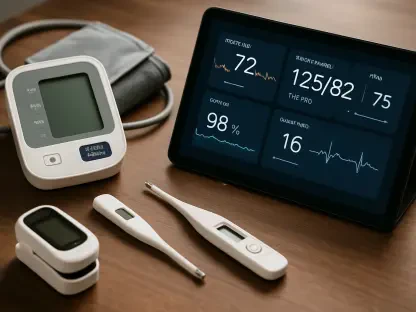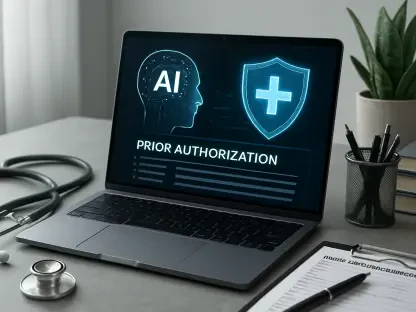Artificial Intelligence (AI) and automation have become pivotal in revolutionizing modern healthcare. Their ability to augment precision, efficiency, and overall patient outcomes makes them critical innovations in the medical sector. As healthcare practices evolve, integrating AI and automation uncovers numerous opportunities and unique challenges that must be strategically addressed.
The Drive for Improved Patient Care
Enhancing Patient Lives Through Technology
At its core, healthcare prioritizes the enhancement of patient lives. Technological advancements surpass traditional healthcare boundaries, offering better patient outcomes. AI algorithms, for instance, aid in the early diagnosis of diseases like cancer, significantly improving patient survival rates. These advanced algorithms can analyze medical images, detect anomalies, and predict diseases with remarkable accuracy. Consequently, they enable healthcare providers to initiate treatment plans sooner, increasing the chances of successful outcomes.
Moreover, AI-driven tools empower healthcare professionals to identify risk factors and monitor patient health continuously. By utilizing wearable devices and sensors, patients can receive real-time feedback on their health status, leading to more informed healthcare decisions. This constant monitoring not only aids in the early detection of ailments but also helps in managing chronic conditions more effectively. As a result, patients experience reduced hospital visits and enjoy a higher quality of life.
Redefining Care Protocols
AI and automation reshape the healthcare landscape by redefining care protocols. Remote monitoring and telehealth services provide continuous patient engagement, reducing the need for frequent hospital visits. These advancements bring healthcare to patients’ doorsteps, making it more accessible and less burdensome. For instance, telehealth platforms enable virtual consultations, allowing patients to receive medical advice without the hassle of travel and long waiting times. This not only enhances patient convenience but also ensures timely intervention, which is crucial in managing health conditions effectively.
Automated appointment scheduling and reminders lessen the administrative burden on healthcare professionals, allowing them to focus more on patient care. These systems handle mundane tasks such as booking appointments, sending reminders, and managing patient records with minimal human intervention. As a result, healthcare personnel can dedicate more time to critical activities like diagnosing and treating patients. This streamlining of administrative processes not only improves operational efficiency but also enhances the overall patient experience, paving the way for a more efficient and patient-centric healthcare system.
AI and Automation as Healthcare Game-Changers
Transformative Impact on Healthcare Delivery
AI and automation transform not just the supplementary aspects but the core of healthcare delivery. Through predictive analytics, AI provides insights into patient trends, helping in the proactive management of diseases. For instance, machine learning models can analyze historical patient data to predict future health issues, enabling healthcare providers to implement preventive measures. This forward-looking approach reduces the incidence of severe health episodes and allows for better resource allocation within healthcare facilities.
Robotic process automation streamlines repetitive tasks such as record-keeping and billing, enhancing overall efficiency. These automated systems handle administrative functions with speed and precision, minimizing the likelihood of errors that commonly occur in manual processes. This not only improves the accuracy of medical records but also accelerates the billing process, resulting in faster reimbursements and financial stability for healthcare institutions. The integration of robotic automation into everyday operations signifies a shift towards more efficient and reliable healthcare systems, ultimately benefiting both providers and patients.
Operational Workflows and Clinical Decision-Making
By incorporating AI-driven decision-support systems, clinicians can achieve greater diagnostic accuracy. These systems analyze vast amounts of data to suggest possible diagnoses and treatment options, making healthcare more personalized and effective. For instance, AI algorithms can process patient symptoms, medical history, and test results to recommend tailored treatment plans. This level of personalization ensures that patients receive the most suitable therapies, increasing the likelihood of positive health outcomes.
The workflow improvements translate to faster patient care and reduced waiting times. Automated systems manage patient flow within healthcare facilities, ensuring that patients are seen promptly and efficiently. This optimization reduces bottlenecks in clinical workflows, allowing healthcare providers to attend to more patients without compromising the quality of care. Additionally, AI-driven tools can assist in monitoring patient progress, alerting clinicians to any deviations from expected recovery patterns. This real-time feedback enables timely interventions, further improving the quality and efficiency of patient care.
Implementation Strategies for AI and Automation
Data Quality and Integrity
Ensuring high-quality data is crucial for building reliable AI systems. High-quality data is characterized by accuracy, comprehensiveness, and impartiality. Implementing proper data governance frameworks helps maintain data standards, while regular staff training ensures consistent data management. For instance, healthcare providers must establish standardized protocols for data entry and validation to eliminate errors and inconsistencies. Periodic audits and assessments can also help identify and rectify any data quality issues, ensuring that AI systems operate on the most accurate and reliable information.
Moreover, maintaining data integrity involves securing data at all stages of the healthcare process. Healthcare organizations need to implement robust data security measures, such as encryption and secure data storage solutions, to protect patient information from unauthorized access and cyber threats. Ensuring data integrity not only builds trust in AI systems but also complies with regulatory requirements, promoting ethical AI deployment. By prioritizing data quality and integrity, healthcare institutions can harness the full potential of AI and automation, delivering accurate and effective healthcare solutions.
Secure and Compliant Data Handling
Data security is paramount in healthcare. Employing advanced encryption techniques ensures data protection during storage and transmission. These techniques safeguard sensitive patient information from unauthorized access and data breaches, maintaining the confidentiality and privacy of health records. Additionally, stringent access controls accompanied by multifactor authentication measures protect against unauthorized data breaches, ensuring continuous compliance with regulatory mandates. These security measures restrict data access to authorized personnel only, minimizing the risk of data misuse and enhancing patient trust in the healthcare system.
Furthermore, healthcare organizations must stay vigilant against evolving cyber threats by regularly updating their security systems and protocols. Continuous monitoring and threat detection mechanisms can help identify and mitigate potential security risks before they escalate. Compliance with healthcare regulations, such as the Health Insurance Portability and Accountability Act (HIPAA), ensures that AI applications meet legal standards and ethical guidelines. Establishing dedicated compliance teams to monitor and audit AI processes reinforces the system’s integrity and maintains the highest standards of data security and patient confidentiality.
Regulatory Compliance and Interoperability
Ethical Deployment of AI and Automation
Adherence to regulatory standards is essential for ethical AI deployment. Establishing dedicated compliance teams to monitor and audit processes ensures that AI applications meet legal requirements while safeguarding patient trust. These teams are responsible for continuously evaluating AI systems to ensure that they adhere to ethical guidelines and deliver unbiased, accurate results. Regular audits and assessments help identify any deviations from regulatory standards, enabling prompt corrective actions and maintaining the integrity of AI applications.
Continuous updates to compliance protocols ensure that healthcare facilities stay ahead of evolving regulations. As regulatory landscapes change, healthcare organizations must adapt their AI systems to comply with new standards and best practices. This proactive approach not only ensures legal compliance but also promotes ethical AI deployment, fostering public trust and acceptance. By prioritizing regulatory compliance, healthcare providers can implement AI and automation technologies responsibly, delivering safe and effective healthcare solutions that benefit patients and society as a whole.
Creating a Unified Health Ecosystem
Interoperability is vital for successful AI integration. Standardized data formats and API-driven systems encourage collaboration between disparate healthcare solution providers. These standards enable different healthcare systems to communicate and share data seamlessly, creating a unified health ecosystem. Seamless data flow across platforms fosters comprehensive and cohesive patient health profiles, enhancing clinical decision-making. Unified health records provide healthcare providers with a holistic view of patient health, enabling more accurate diagnoses and personalized treatments.
Additionally, interoperability facilitates real-time data exchange, ensuring that healthcare professionals have access to up-to-date information when making critical decisions. For instance, during emergency situations, instant access to patient records can significantly improve response times and treatment outcomes. Collaborating with various healthcare stakeholders, including technology providers, policymakers, and medical institutions, is essential to establishing interoperable systems that promote efficient and effective healthcare delivery. By creating a unified health ecosystem, AI and automation can drive significant advancements in patient care and operational efficiency.
Future Advancements in AI and Automation
Blockchain for Enhanced Security
Integrating blockchain technology into healthcare can significantly enhance data security. The decentralized nature of blockchain ensures transparency in data exchange, reducing fraud and improving data integrity. Blockchain technology enables secure and tamper-proof record-keeping, making it an ideal solution for managing sensitive patient information. This transparency builds trust among patients and healthcare providers, as all data transactions are visible and verifiable, minimizing the risk of data manipulation and fraud.
Moreover, blockchain could revolutionize administrative tasks, making them more secure and efficient. By automating processes such as patient consent management, billing, and claims processing, blockchain can streamline administrative workflows, reducing the burden on healthcare personnel. Smart contracts built on blockchain platforms can facilitate secure and transparent transactions, ensuring that all parties involved adhere to predefined terms and conditions. The integration of blockchain technology in healthcare not only enhances data security but also improves the overall efficiency and reliability of administrative processes.
Machine Learning and Personalized Medicine
Artificial Intelligence (AI) and automation are transforming modern healthcare, bringing significant improvements in precision, efficiency, and patient outcomes. These technological advancements have become essential in the medical field, offering solutions that enhance diagnostic accuracy, streamline administrative tasks, and personalize patient care. For instance, AI algorithms can analyze medical images with remarkable accuracy, aiding early detection of diseases. Automation reduces the burden of routine tasks such as appointment scheduling and patient data management, freeing up healthcare professionals to focus on more critical aspects of patient care.
However, the integration of AI and automation in healthcare is not without its challenges. Concerns over data privacy, the need for robust cybersecurity measures, and the potential for job displacement among healthcare workers must be strategically addressed. Additionally, there is a need for continuous training and education to ensure healthcare practitioners can effectively use these technologies. As healthcare practices continue to evolve, the thoughtful implementation of AI and automation is crucial for maximizing their benefits while minimizing potential drawbacks.









